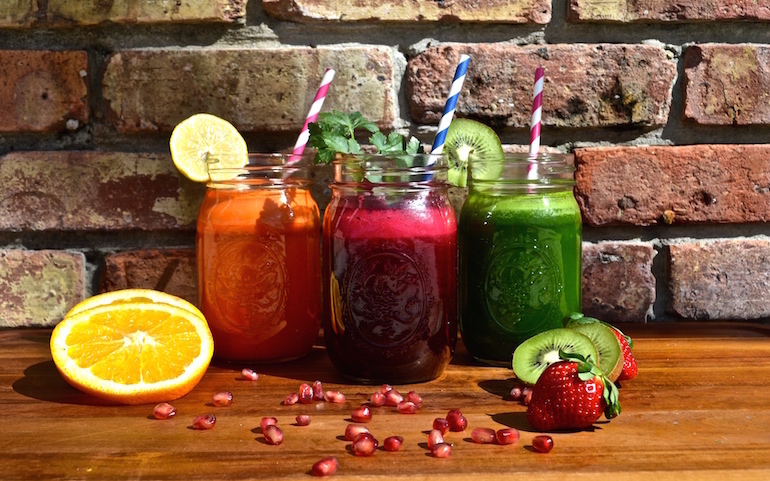In recent years, the juice-fast diet has gained popularity as a means of detoxification, weight loss, and overall health improvement. Advocates of the juice fast claim that it helps cleanse the body of toxins, boost energy levels, and aids in shedding excess pounds. If you’re intrigued by this trendy diet, read on to discover a comprehensive guideline that will help you understand the ins and outs of the juice-fast diet.
What is a Juice Fast Diet?
The juice fast diet, also known as juice cleansing or juice detox, involves consuming only freshly extracted fruit and vegetable juices for a specific period, usually ranging from a few days to a couple of weeks. During this time, solid foods, caffeine, alcohol, and processed beverages are strictly avoided. The primary focus is on drinking nutrient-rich juices, which proponents believe can nourish the body while giving the digestive system a much-needed rest.
The Purported Benefits
- Improved Skin Health: Juices are rich in vitamins and antioxidants that can promote healthier skin. Nutrients like vitamins C and E help in collagen production, reducing the appearance of fine lines and wrinkles. The hydration from increased water intake during the juice fast can also contribute to a more radiant complexion.
- Enhanced Mental Clarity: Some individuals report improved mental clarity and focus during a juice fast. This could be due to reduced consumption of processed foods and added sugars, which can lead to mental fog and sluggishness.
- Immune System Support: The abundance of vitamins and minerals in fresh juices can boost the immune system’s function. Vitamin C, in particular, is known for its immune-boosting properties, helping the body fight off infections and illnesses.
- Reduced Inflammation: The high antioxidant content in fruits and vegetables can help combat inflammation in the body. Chronic inflammation is linked to various health issues, and a juice fast may provide a short-term opportunity for the body to reduce inflammation.
- Healthier Digestive System: During the juice fast, the digestive system gets a break from processing solid foods. This rest period can allow the digestive organs to rejuvenate and function more efficiently.
- Alkalizing the Body: Many fruits and vegetables are alkaline-forming, which can help balance the body’s pH levels. An alkaline environment is believed to support overall health and may reduce the risk of certain health conditions.
- Better Sleep: Some people experience improved sleep quality during and after a juice fast. This may be attributed to the removal of caffeine and other stimulants from the diet, as well as the calming effects of certain nutrients in the juices.
- Increased Hydration: Juices are a fantastic source of hydration, which is essential for maintaining various bodily functions, including temperature regulation, nutrient transport, and waste elimination.
How to Do a Juice Fast Diet: Step-by-Step
- Choose the Right Juicer: Invest in a high-quality juicer that efficiently extracts juice from fruits and vegetables while preserving their nutritional content.
- Select Organic Produce: To minimize pesticide exposure and maximize health benefits, opt for organic fruits and vegetables whenever possible.
- Plan Your Cleanse: Decide the duration of your juice fast. Beginners often start with a 1 to 3-day cleanse, while experienced individuals may go for longer periods (5 to 7 days).
- Create a Variety of Juices: Aim for a diverse range of fruits and vegetables to ensure you get a broad spectrum of nutrients during the fast.
- Stay Hydrated: Drink plenty of water throughout the day to stay hydrated, as juices might not provide enough water on their own.
Potential Tips for a Successful Juice Fast Diet:
- Preparation is Key: Before starting your juice fast, mentally prepare yourself for the challenge ahead. It can be beneficial to gradually reduce your intake of caffeine, processed foods, and sugary snacks in the days leading up to the cleanse. This can help ease potential withdrawal symptoms and make the transition smoother.
- Start with Simple Recipes: If you’re new to juicing, begin with simple juice recipes that include familiar fruits and vegetables. As you become more comfortable, you can experiment with more adventurous combinations.
- Stay Hydrated Between Juices: While you’re on the juice fast, it’s important to keep yourself hydrated by drinking plenty of water in addition to the juices. Herbal teas can also be a great addition to your hydration routine.
- Use High-Quality Produce: Choose fresh, organic, and locally sourced fruits and vegetables whenever possible. High-quality produce will ensure that you get the most nutritional benefits from your juices.
- Don’t Overdo the Fruit: While fruits can add natural sweetness and flavor to your juices, they are also high in sugars. Balancing fruit with a variety of vegetables is essential to prevent excessive sugar intake.
- Incorporate Greens: Leafy greens like kale, spinach, and Swiss chard are nutritional powerhouses. They are rich in vitamins and minerals and add a healthy dose of chlorophyll to your juices.
- Include Healthy Fats: Consider adding a small amount of healthy fats to your juices, such as avocado or flaxseed oil. Fats can help with the absorption of fat-soluble vitamins present in fruits and vegetables.
- Rotate Ingredients: Vary your juice ingredients to ensure you get a wide range of nutrients. Different fruits and vegetables offer different health benefits, so mix them up to get the most out of your cleanse.
- Practice Mindful Eating: If you find yourself missing the sensation of chewing during the juice fast, try drinking your juices slowly and mindfully. Savor the flavors and textures to enhance the overall experience.
Post-Juice Fast: Maintaining the Benefits
Once you’ve completed your juice fast, it’s essential to maintain the positive effects and not undo your hard work. Here are some tips for post-juice fast transition:
- Slowly Reintroduce Solid Foods: Gradually reintroduce solid foods into your diet, starting with easily digestible and light options such as soups, salads, and steamed vegetables.
- Focus on Whole Foods: Continue to prioritize whole, nutrient-dense foods like fruits, vegetables, whole grains, lean proteins, and healthy fats.
- Make Juicing a Part of Your Routine: Consider incorporating juicing into your regular diet as a supplemental source of nutrients. Freshly squeezed juice can be an excellent addition to a balanced meal plan.
Conclusion
The juice-fast diet can be a refreshing and beneficial way to reboot your eating habits, flush out toxins, and kickstart weight loss. Its benefits can be maximized when integrated into a balanced and sustainable lifestyle that includes a variety of nutrient-dense foods, regular physical activity, and proper hydration.



